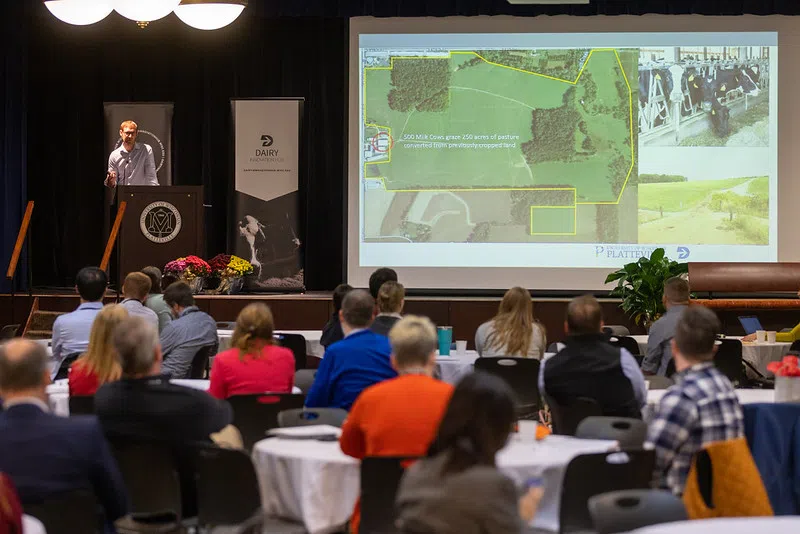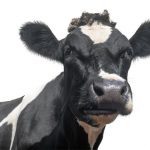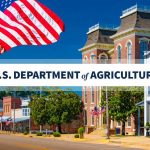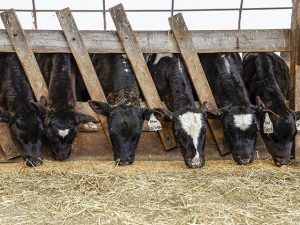
The Dairy Innovation Hub held its fourth annual Dairy Summit on Wednesday, November 15, in Velzy Commons on the University of Wisconsin–Platteville campus. More than 150 researchers, campus affiliates, students, dairy professionals, and community members attended the event in-person. Another 100 people attended the event virtually, and videos of summit sessions are available online.
Through poster sessions, research presentations, and panel discussions, the Dairy Summit highlighted examples of the Hub’s newest research and facilitated discussions about how this work can help meet the challenges facing today’s dairy community.
“UW–Platteville is excited to host this year’s Dairy Summit,” says Chuck Steiner, interim dean of the College of Business, Industry, Life Science and Agriculture (BILSA) at UW–Platteville, “We have an opportunity to showcase the research, education, outreach, and all the talented people that are helping to bring about change and opportunities for the dairy industry in the state.”
The Dairy Innovation Hub, funded through a $7.8 million per year investment by the state of Wisconsin, harnesses research and development across the UW–Madison, UW–
Since its launch in 2019, the Hub has funded more than 200 projects and hired 17 faculty positions across the three campuses.
The summit kicked off with posters featuring more diverse Hub-funded research. More than 30 posters were available throughout the day and online. UW–Platteville Chancellor Tammy Evetovich and Chuck Steiner gave welcome comments and attendees were introduced to members of the first panel.
Tera Montgomery, professor of animal, dairy and veterinary sciences and director of the School of Agriculture at UW–Platteville, moderated the opening panel discussion focused on Hub-funded projects with on-farm research components. Platteville professor of engineering physics Hal Evenson and farmer and owner of Wilson Organic Farm Chris Wilson discussed their multi-year collaboration on developing a virtual fencing system to help manage rotational grazing on Wilson’s farm.
Following Evenson and Wilson, Platteville assistant professor of animal and dairy science Ryan Pralle and farmer and owner of Stone-Front Farm Andy Buttles took the stage. Pralle has developed a unique blood biomarker panel to predict fatty liver syndrome, a metabolic disorder that negatively impacts dairy cows. Buttles’ farm has provided over 200 cows to test the panel.
These two partnerships are a win for everyone — researchers tackle challenges in a real-world setting, students involved in the research receive practical experience, and the farmers can help ensure new discoveries work on-farm.
“I love dairy farming, and I also enjoy innovating new ideas and strategies to meet the challenges of tomorrow in dairy farming. Ideas that can better not just our farm but offer opportunities to other farmers and future farm generations,” says Wilson. “Projects like this one wouldn’t be possible without the support from the Dairy Innovation Hub.”
Next on the agenda were research introductions, organized in two blocks by the Hub’s four priority areas. First was growing farm business and communities and stewarding land and water resources presentations, followed by enriching human health and nutrition and ensuring animal health and welfare. Each presenter had around 10 minutes to describe their work, followed by a short question and answer session at the end of each block.
“I am excited to be here because this is the fourth Dairy Summit, but this is my very first one,” said Marta Kohmann at the beginning of her presentation. Kohmann started in January 2023 as an assistant professor in plant and agroecosystem sciences at UW–Madison. “I am very appreciative of the Dairy Innovation Hub’s support — [this project] was actually the first grant that I applied to as an assistant professor, and I got it!” Kohmann went on to describe her work on manure application recommendations for alfalfa interseeded into corn silage.
In addition to Kohmann, eight other researchers and two students took the stage to discuss the cost of production for Wisconsin dairy farms, dairy waste products as 3D printing materials, novel cold plasma technology to enhance the safety and growth of alfalfa, an update on the student-run Pioneer Sweets and more.
Jade Wodack, an undergraduate studying atmospheric and oceanic sciences at UW–Madison, joined UW–River Falls assistant professor of environmental sciences and Hub-funded faculty member Susanne Wiesner at the podium to discuss their project on establishing a baseline greenhouse gas budget for Mann Valley Dairy Farm in River Falls.
“It was nerve wracking, but in the end, it was very worth it,” says Wodack, “I got a lot of compliments on the presentation itself and it’s been great meeting new people [at Summit].”
Attendees — and presenters — got a break in the form of lunch before the closing panel discussion commenced. During the lunch break, UW–Madison graduate student Erin Kammann mingled around her two posters: one on early lactation milking frequency in automated milking systems and predicting high liver triglycerides in cows.
“Having a poster at Dairy Summit definitely helps facilitate questions and allows me to talk about my research,” says Kammann. “You also get the chance to see everyone else’s posters and see all the different areas work is being done in.”
Kammann, who is pursuing a master’s degree, is co-mentored by Hub faculty director and animal and dairy sciences professor at UW–Madison Heather White and Hub-funded faculty member Ryan Pralle. The collaboration between the two campuses and two mentors has been her favorite part of participating in Hub research.
Chad Zuleger, director of government affairs at the Dairy Business Association, moderated the closing panel, reflecting on the past four years of the Dairy Innovation Hub with Wisconsin state leaders. Panelists included Senator Howard Marklein (R-Spring Green), Representative Dave Considine (D-Baraboo) and Representative Travis Tranel (R-Cuba City). The panel touched on the Hub’s beginnings, its successes, and areas where the Hub could grow in the future. All three state leaders were instrumental in legislation that created the Dairy Innovation Hub.
“[The bill] wasn’t as much of a sell that I had to make, it was a sell that that agriculture groups made,” said Representative Considine during the panel. “Frequently, ag groups will come in on different sides of an issue. The part that I really liked was the fact that every group said ‘This is a good idea.’ When that happens at the state capitol, we take notice.”
The Dairy Summit concluded with three optional tours showcasing Hub investments at UW–Platteville, including lab spaces in Sesquicentennial Hall and Russell Hall, and technology investments at Pioneer Farm. Those who did not attend a tour enjoyed the plethora of research posters and additional networking time.
“The Dairy Innovation Hub has provided significant investments here at UW–Platteville, both in our labs and on our campus farm,” says Steiner. “It’s also provided opportunities for us to partner with farmers in the area on projects that are critically important to the dairy community. We hope to continue to expand upon some of the research that’s ongoing now and into the future.”
Video recordings of the Dairy Summit sessions can be watched on the Hub’s YouTube channel.























